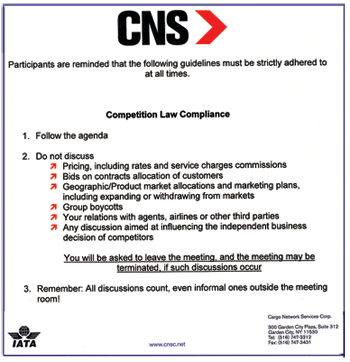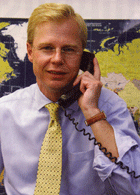CNS Gag Order For Cargo
 Mark
2007 as the year that air cargo industry trade events came with a warning
label. Mark
2007 as the year that air cargo industry trade events came with a warning
label.
Some air cargo types don’t much like
it either.
"The end of free speech in airfreight?
“As agents now we can't ask carriers for better rates or for a collection
fee for surcharges; can't discuss business or security challenges?
“Burma looms over the air cargo industry!
“Order of the day:
“Unite but shut up with tails between
our legs.
“What brave leaders we have.
“Tony Calabrese must be having a good
chuckle over his next glass of splendid red wine," was one comment,
as CNS the U.S. arm of IATA Cargo held the first in a series called “Road
Show” at a JFK International Airport hotel last week.
 A
lively turnout as CNS President Jens Tubbesing hosted a morning session
that included latest updates covering the various CNS operations including
CASS, security, e-freight, Cargo 2000 and other initiatives important
to air cargo. A
lively turnout as CNS President Jens Tubbesing hosted a morning session
that included latest updates covering the various CNS operations including
CASS, security, e-freight, Cargo 2000 and other initiatives important
to air cargo.
But one feature of this gathering that raised
both attention and a certain amount of angst, was a simple typewritten
piece of CNS letterhead paper that was handed to every attendee titled:
“Competition Law Compliance”
“Follow the agenda,” the document
said.
“Do not discuss pricing, including
rates and service charges, commissions, bids on contracts, allocation
of customers, geographic/product market allocations and marketing plans,
including expanding or withdrawing from markets, group boycotts, your
relations with agents, airlines or other third parties, (or) any discussion
aimed at influencing the independent business decision of competitors.
“You will be asked to leave the meeting,
and the meeting may be terminated, if such discussions occur.
“Remember all discussions count, even
informal ones outside the meeting room.”
Coming on the heels of recent headlines
many in the CNS Road Show audience of professional air cargo people read
the directive last week at the start of what was thought to be a simple
day of instruction, in utter disbelief.
“That we are being told we cannot
talk about business in this manner sounds like there has been some kind
of suspension of freedoms,” one attendee told ACN/FT.
“What are they, (CNS) afraid of?”
Well-respected air cargo industry icon Bill
Boesch weighed in on the subject:
“Everybody knows that there is a right
way of doing business.”
“Following the law is what has made
every civilization great when the laws are truly the intention of the
people.
“And in this case they are.
“Our industry has obeyed the law and
in many cases has had lawyers present at meetings to insure that the participants
stayed on track and could defer conversations, as some of the rules and
regulations, unfortunately, are not as simple as black and white.
“Air cargo executives are competent
professionals empowered by their company owners to act within the law.
“I can understand how they would feel
going to a CNS meeting and be handed a piece of paper with basic rules
and regulations.
“Would CNS do the same thing at a
meeting with the heads of American, United, Delta etc.?
“If the answer is no, then CNS has
to ask itself how it could have handled the situation better.
“One suggestion is that they (CNS)
might have sent out a legal briefing paper before the meeting and suggested
that the cargo heads review it with their legal department and staff prior
to the meeting.
“Also having a lawyer monitoring a
gathering is common practice even in the area where IATA has anti trust
immunity.
“So having a legal person at the meeting
would benefit all parties and it could have been stated in this manner.
“The professionals in the air cargo
industry want to follow the law.
“One problem right now is that there
is a lot of confusion being circulated by industry people and companies
that would benefit from this confusion,” Mr. Boesch concluded.
Another executive who asked to not be identified
also had questions.
"Without dialogue among carriers, freight
forwarders, shippers and consignees, our shipping industry would not have
achieved what has been accomplished to date as a (mostly) effective way
to move customers’ products.
“From schedules to maximizing pallets,
from CASS to better security, from integrated road transport to logistics
and then some, very little of air cargo growth would have been possible
without constant dialogue among the participants.
“None of this has to do with price
fixing.
“It's undeniable, that some misguided
souls have resorted to this practice and it seems they are paying the
price, but an organization like CNS was created to further the dialogue
between carriers and forwarders and to improve service levels and internal
accounting issues, not to engage in price fixing.
“As far as forwarders are concerned,
with the constant downward pressure on pricing from shippers and consignees
alike, it is simply absurd to think that the thousands of forwarders around
the world would ever attempt, let alone succeed to "fix" a price
as they are in fierce competition with each other for business.
“Co-loading structures agree on cost,
not on the price they charge to their customers.
“There may be a question though in
regard to newly forming joint ventures like Lufthansa and DHL's NewCo.
“Is an organization like that, which
is also inviting outside forwarders and shippers to use this service,
in danger of being accused of collusion?"
Coming on the heels of charges of collusion
and price fixing fines against British Airways and Korean Air no one it
seems is neutral.
CNS apparently will be distributing this
paper at every stop of its U.S. Road Show during October, to professional
air cargo audiences in Los Angeles, Chicago and San Francisco.
The bigger question is whether every air
cargo industry trade show will now be under an instructional cloud to
refrain from discussing an ever-broadening menu of topics that might be
considered as part of a price fixing or service colluding deal with others?
One can only wonder what this CNS move may
portend in fact for the very future of air cargo industry trade shows
themselves as a viable form?
Why for example would anybody want to take
a chance that some microphone lurking in his or her shrimp cocktail might
pick up some indiscretion or other conversation that might come back later
as part of a court document?
According to sources during the most recent
CNS Partnership Conference last May in San Diego, at least one and possibly
several air cargo executives were awakened in their hotel rooms at sunrise
by U.S. Federal law enforcement officers with summonses connected to ongoing
price fixing investigations.
Maybe that experience is what drove CNS
to distribute this warning letter.
We wonder if a disclosure or qualifying
statement will become standard at all air cargo organized events much
like the small type in car loans and other legal disclaimers so in evidence
almost everywhere else?
Air Cargo News/FlyingTypers also
wonder what the organizations that purport to represent the interests
of air cargo are doing either by themselves or as a collective effort
to bring some clarity and learned opposition to law enforcement that could
too easily tilt out of control?
The time for organized air cargo to act
is now before this price fixing and collusion becomes a witch-hunt by
some over zealous government bureaucrats.
We want to know who is looking out for the
hard working air cargo executives?
Big and small companies in air cargo in
their efforts to do business may end up winning one of those trade show
trophies for “Best Perp Walk” after being taken away in chains
and hustled into a hurry up wagon because somebody sounded off and said
some things after a few too many adult beverages at a trade show.
CNS is to be commended for Road Show.
The idea to address important issues that
foster better understanding is a noble cause.
The effort can only better things for everybody
in air cargo.
But it seems to us that the top agenda item
in terms of addressing challenges to air cargo right now are the issues
raised by this simple piece of paper.
Geoffrey
|



